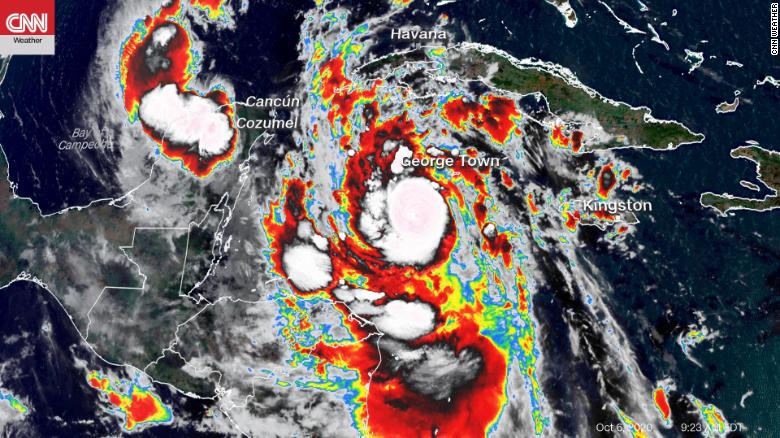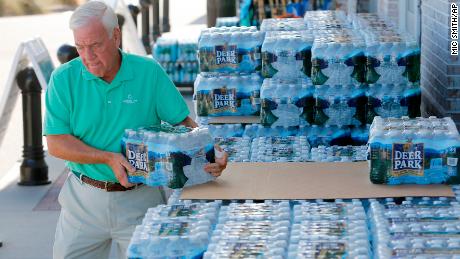(CNN)If you thought the past week's lull in hurricane season was a sign of it slowing down -- think again.
Hurricane Delta is an "extremely dangerous" major hurricane on a collision course with Mexico's Yucatan Peninsula and the US Gulf Coast. It will directly impact Cancun and Cozumel as a dangerous Category 4 storm.
The storm is the second-strongest of the year in the Atlantic basin -- at 145 mph, it's just behind Hurricane Laura, which reached 150 mph.
After undergoing a "very impressive rapid intensification episode" earlier, the National Hurricane Center said "some additional strengthening is likely to occur before Delta makes expected landfall on the northeastern coast of the Yucatan Peninsula" on Wednesday morning.
Delta went from a tropical depression to a Category 4 hurricane in about 30 hours from Monday to Tuesday.
At one point, Delta's winds had increased by 85 mph in 24 hours. That's the largest jump in wind speed in October since Hurricane Wilma in 2005, the last major hurricane to strike Cancun.
The storm was about 180 miles east-southeast of Cozumel on Tuesday night, with maximum sustained winds of 145 mph and traveling at about 17 mph.
While the Yucatan sticks out like a thumb south of the Gulf of Mexico, there have only been six hurricanes that passed within 50 miles of Cancun in the past 100 years.
"Only two of them have been major hurricanes, Gilbert in 1988 (a Category 5 storm with 160 mph winds) and Wilma in 2005 (A Category 4 hurricane with 130 mph winds)," said CNN meteorologist Brandon Miller.
Gilbert and Wilma were both legendary storms and "are actually the top two most intense storms on record by lowest pressure in the Atlantic's history," said Miller.
Both of those storms devastated Cancun's tourism industry, which took years to rebuild.
Landfall is expected anywhere from Cozumel to Cancun as a powerful Category 4 storm with 140 mph or greater wind speeds. "It could be stronger than indicated," the NHC said.
Delta is currently "the strongest Greek alphabet named Atlantic hurricane on record," tweeted Phil Klotzbach, a research scientist at Colorado State University.
Impacts from Delta will be felt through Wednesday, across the Yucatan Peninsula and Cuba as the storm passes through.
A storm surge of 9 to 13 feet above normal tide levels is possible along much of the northern coast of the peninsula.
Rainfall amounts of 4 to 6 inches are possible, with isolated amounts reaching 10 inches. Dangerous flash flooding and mudslides are also possible across western Cuba.
Hurricane-force winds extend 25 miles from the center and tropical storm-force winds extend up to 90 miles from the center.
Louisiana prepares for a 4th landfall this year
The governors of Louisiana and Alabama declared states of emergency in preparation for the storm.
"Hurricane Delta is an incredibly dangerous storm that will bring heavy winds, rain and life threatening flooding and storm surge to coastal Louisiana," Louisiana Gov. John Bel Edwards said in a release.
"Everyone in South Louisiana should pay close attention to the weather in the coming days and heed the advice and directions of their local officials," Edwards said. "All of Louisiana's coast is in the tracking cone, and we are well aware that impacts can be felt outside of the track."
Edwards earlier warned coastal parishes that it is time to prepare for Hurricane Delta. "It is common for many people to experience hurricane fatigue during a busy season, but we need everyone to take this threat seriously," said Edwards.
Alabama Gov. Kay Ivey said the storm could have significant impacts on the state just weeks after Hurricane Sally's widespread destruction to coastal areas there.
"As residents along the Gulf Coast know all too well, these storms are unpredictable, and I strongly encourage everyone to take Hurricane Delta seriously," Ivey said in a statement.
Mandatory evacuations of Alabama's coast will begin as early as Wednesday, Ivey said.
In Mississippi, the state's emergency management agency has sent 160,000 sandbags to three counties on its southeastern coast.
People are still displaced from Hurricane Laura
Louisiana's State Emergency Operations Center has been activated since March because of the coronavirus pandemic and is still dealing with the recovery from Hurricane Laura, which struck the area in August.
More than 6,600 people who evacuated ahead of Laura are still being housed in hotels that are being used as shelters, Edwards said. Evacuees from that storm were in 42 different hotels at one time, and they are now being consolidated into10 in New Orleans, one in Baton Rouge and one in the Lafayette area.
If Delta makes landfall in Louisiana, it will be the fourth landfall of a named storm this year in the state. Something that has never happened.
"The most recent season with three landfalling storms was 2005 with Cindy, Katrina, and Rita affecting the most southwestern and southeastern regions of Louisiana," Jhordanne Jones, a researcher at Colorado State University, tells CNN weather.
From Mexico, the storm is forecast to move into the western Gulf of Mexico on Wednesday into Thursday but isn't expected to hit the US coast until overnight Friday into Saturday.
The Gulf may be conducive for Delta to maintain its impact, but with three days until it reaches the US, forecasts are still uncertain, said CNN meteorologist Pedram Javaheri.
Current guidance suggests Delta will make landfall somewhere between the border of Texas and Louisiana to the border of Alabama and Florida as a Category 3 hurricane.
"Although there is still significant uncertainty regarding Delta's intensity when it nears the northern Gulf coast, it is becoming increasing likely that the system will pose a significant wind and storm surge threat to a portion of that area," according to the National Hurricane Center.
And the size of the storm is forecast to increase significantly between Mexico and the US coast, "So regardless of Delta's final landfall intensity, the projected large size of the hurricane is likely to result in a significant storm surge and wind" for parts of the northern Gulf Coast, the center said.
The season's 25th named storm
Delta's intensification turned it into the 25th named storm of the Atlantic hurricane season. That includes 21 named storms in the standard list of names along with the now four named storms in the Greek alphabet, Javaheri said.
This is only the second time the Greek letter Delta has been used for any named storm and it is the earliest-ever 25th Atlantic storm. The previous was Delta on November 15, 2005.
With nearly eight weeks still left in the hurricane season, the number of named storms is nearing the all-time record for one season in 2005 when 28 storms were recorded.






